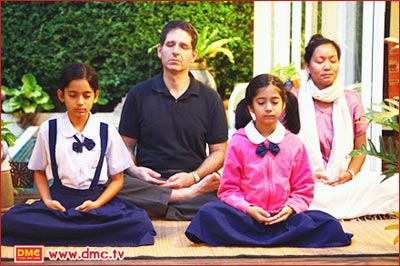The Heart of the Family#3
The Heart of the Family
2) Self-control or dama corrects the problem of foolishness, of not keeping up with people, the world and of surrendering to defilements.
Dama means having self control.
The way to practice self – control is to be alert and to train oneaelf without exception, by giving oneself more knowledge, ability, and goodness everyday.
Self – control can also be referred to colloquially as, “loving to train oneself.” And sometimes the elders may refer to it as, “Don’t let yourself be foolish.”
The way to increase one’s knowledge, ability and goodness in every way is to follow these 4 guidelines:
2.1) You must find a good teacher. That means that regardless of whether a person is interested in a subject or wishes to increase his/her knowledge, that person must find a teacher who has knowledge and ability in that area before doing anything else. Otherwise, there are many opportunities for failure. If a person is truly unable to find the right teacher, at the very least, one should find a teacher who has the most knowledge in the area of interest.
2.2) You must listen to your teacher. That means that you should listen carefully to your teacher. Listen many times over and ask questions until you truly understand. It is important to understand clearly what your teacher is teaching, in theory, method, practice, and so on, as far in-depth as the subject matter reaches.
2.3) You must analyze the teacher’s words. Look at every point that the teacher has explained and analyze it until you truly understand the reasoning for its significance, its practical use, its precautions, its benefits and disadvantages.
2.4 You must follow the teacher’s instructions. That means that after you analyze the material and understand what is correct and proper, you begin to follow and practice those teachings with attention and care. You must not be careless because it may bring damaging results later on.
Those who have full knowledge, ability and goodness must follow only this path in order to train themselves to keep up with the world and its people, and not surrender to defilements.
Surely, if you follow this road, you will have to go against your will, you will need to control your mind, and sometimes you will hurt your mind, just as if you were suffering from a bleeding heart.
The reason that you must control your mind and go against your will is because if a type of training cannot change one’s habits, it cannot be considered self-training.
For example, if you are unable to change a habit like snacking, which is not easy to do, or unable to change a habit like sleeping in, using unpleasant worlds when speaking, or talking back to your parents, you have to find the right method to correct yourself, including training yourself to not be careless. This is not easy to do so. For some of us, it may take our entire lives to correct these bad habits, and we are not even counting the more serious habits of drinking, jealousy and gambling.
Therefore, for a family to have a strong foundation, the family members must have self – control or dama as the second habit.
Dama means having self control.
3) Endurance or khanti corrects the problems of people being tired of each other.
Khanti means endurance.
Why must we have endurance? We must have endurance because if someone wants to increase goodness within themselves, that person must have endurance to exchange with goodness.
Having been born as humans, what do we have to endure? The answer is there are 4 areas of endurance that are part of our human condition:
3.1) We must endure a natural environment that is not favorable to us, such as the sun’s strong rays, heavy wind and rain, etc.
3.2) We must endure suffering, which means, we must endure the unfavorable conditions that our physical body experiences, such as sickness, without creating an uproar or excessive complaints.
3.3) We must endure conflict, which means, we must endure other people.
The truth is that we must accept that we have weaknesses which we have displayed, feelings we have that go against our will, and events that do not go as planned. In particular, when we work quickly, or when we require meticulousness, there is something that still displeases us.
When we are displeased with ourselves, they are considered weaknesses that have turned into bad habits. And we will notice that we have overlooked so many other points.
There are weaknesses among husbands, wives, and children, plus the weaknesses present in ourselves that we must include. There is no way to avoid conflict.
Therefore, even when a husband and wife who live in the same house are good to each other, they will still have weaknesses. If we think that we are unable to endure this, please do not have a weak heart and get married.
But nowadays, although some people may have already gotten married, they like to refer to individual rights. After they get married, they still drew up papers, getting ready to separate. This creates the question, “If you didn’t thinks you would be able to endure each other, why did you get married?”
The elders had a saying regarding a husband and wife, “It is like tongue and teeth – they always bump into each other.”
Therefore, it does not matter how good a couple is together because they will inevitably have conflicts. If they think that when they fight with each other, they cannot stand each other, they should not have bothered to marry each other. But if their mind is made up, they can stand their spouse, and their sponse’s family is willing to give him/her up, they must talk about it and figure out how they can put up with each other. This is better than talking about something else.
The question they have to ask each other is, “Are you sure that you can tolerate me?” If we are not sure whether or not we can tolerate each other, then we should not get married. If we do, we will stir up or create bad kamma. So a loving couple will turn into enemies in the future. Should we separate now instead? That is the question that both of you should ask yourselves before you get married.
So instead of asking how many carats there are in the engagement ring, how much money you will get, how many millions you will spend to buy a house, all of those things are unstable, the more important question you should be asking is, “ Are you sure you can tolerate me?”
If you really think about it, there are many more people, in addition to your spouse, that you must endure, such as the parents, siblings, and relatives from each side. These are people you cannot ignore, and you must endure any potential conflicts throughout your life.
Therefore, in order to have a stable foundation for the family,
family, family members must have endurance or khanti as their third habit.
3.4 We must endure defilements or kilesa, which means we must endure our own negative behaviors.
Defilements are a dangerous disease of our mind that come attached to us since birth. As the disease advances, it squeezes us, controls us and wears us down to perform all kinds of bad deeds shamelessly. Then when we perform the bad deed, defilements let us suffer, receive punishments, experience all kinds of distress, which causes us to feel regret and later criticize our actions.
Some people who are unable to withstand the control defilements have on them become people who have a habit of doing bad deeds. In the end, those people will no longer have any goodness within them and may develop addictions along the Roads to Ruin, which are harder to correct.
The Roads to Ruin or Apayamukha are external stimuli that always incite the defilements to advance in our minds until they turns into entrenched bad habits that are very difficult to reverse.
The most dangerous Road to Ruin is associating with fools, because fools spread infections of ‘badness, ‘ without exception, to those around them. The defilements in the mind will control them until they become slaves at performing bad deeds without thinking about the suffering of others. Associating with fools is similar to adding the dangerous infections of the mind to urselves. Good habits from the past are repeatedly destroyed by defilements, and they will transform into bad habits instead.
Because defilements affect good habits, a family’s stability and safety depends on our ability to endure defilements by rigorously training ourselves in two areas:
3.4.1 Endurance in controlling bad habits within ourselves to prevent them from influencing others. If they are unable to endure this, then a husband and wife who choose to stay together will develop more bad kamma with each other. That could lead them to commit aggressive acts against each other, break apart their unity, take sides, and exploit one another.
3.4.2 Endurance to resist the six Roads to Ruin, which are: Drinking alcohol, enjoying the nightlife, going out to places of entertainment, gambling, associating with fools, and laziness towards work. If one is unable to have the endurance to resist the six Roads to Ruin, the family’s financial situation will fall apart, as it is unable to maintain a stable foundation.
If everyone in the family can train themselves to have endurance in these two areasm then our individual habits will improve. The family’s financial situation will stabilize. Only good people will be in our company and fools will stay away. The Roads to Ruin will be distant from the family.
Therefore, in order to have a stable foundation for the family, family, family members must have endurance or khanti as their third habit.
Meditation - Related Articles
" />
" />
" />
" />








